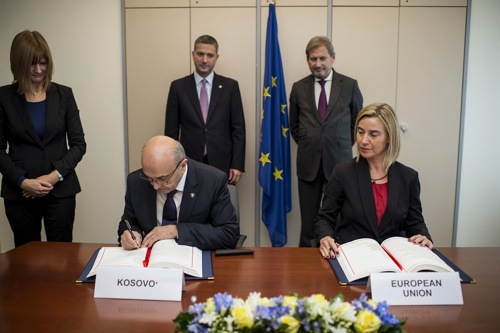

This blog postlooks at the case of Slovakia which, along with Greece, has been the most flexible of the five holdouts. The blog post will also examine the question of what could be the next realistic benchmark in normalisation of Slovakia's relationship with Kosovo.
SAA under special procedure
Until this week, Kosovo was the last Western Balkan country without an SAA - a basic pre-condition for long-term EU integration. Given the negative effect on its economic prospects,the five EU non-recognizers:Cyprus, Greece, Romania, Slovakia and Spain,were willing to look for alternative legal solutions to include Prishtina into the SAA process. Additionally, it was also a direct consequence of the 2013 milestone agreementbetween Serbia and Kosovo.
Legally, the European Commission proposed that the SAA with Kosovo would be signed by the EU as a single entity instead of being ratified by all member states. This procedure was approved at the EU Council by all 28 members, including the non-recognizers, with the overall consensus reflecting the immense political will and diplomatic efforts that had been placed into the progress of the Belgrade – Prishtina political dialogue.
As a result, the EU non-recognizers exert a dual-track policy of maintaining their national positions while simultaneously not blocking the integration process of the former Serbian province. When the SAA signature with Kosovo was announced on October 21, Slovakia’s Foreign Minister, Miroslav Lajčák, hailed the move on his Twitter account as a‘key step to reinforce European perspective and a reminder of key challenges and reform homework’.
Along with Greece, Slovakia has been the most pragmatic out of five EU non-recognizers. Both opened their diplomatic liaison offices in Prishtina prior to the 2008 declaration of independence; they later agreed to accept passports and documents issued by Kosovo; furthermore they allowed or even supported Kosovo’s membership in some international organizations important for its economic development (EBRD, the World Bank). At the same time, Greek and Slovak diplomacies have always made it clear that none of these steps imply recognition, which still remains off limit.
The two main targets of Prishtina’s diplomatic wish list for Athens and Bratislava this year are: support (or at least an abstention) in the vote on Kosovo’s membership in UNESCO and the opening of small liaison offices (incidentally, one has been opened in Belgrade by Kosovo).
If this diplomatic plan works, a new model will be established also for Romania.
While Greece openly supports the UNESCO bid, it is more likely that Slovakia would abstain. However, the Slovak Foreign Ministry was already presented with a proposal for opening a Kosovo Representation office focused on promoting trade and public diplomacy, maintaining diplomatic contacts and providing limited consular functions. During the summer, Slovak and Kosovar diplomats were discreetly talking about technical and legal modalities.
After careful considerations, Bratislava signaled to Prishtina that it is prepared to move ahead once the Athens office is opened. The Greek precedent is seen as a useful pretext in Bratislava in case the issue should become politicized and seized up by nationalist politicians or by the media. Moreover, it is not clear whether the final decision in Bratislava would be made before the forth-coming parliamentary elections in March 2016. However, the preparatory legal and logistical work could be started below the radar. The formal opening of the Kosovo Representative Office in Bratislava could then take place in the Spring, just in time for the Slovak EU Presidency in the second half of 2016.
On the right track
The opening of the Kosovo Representation office in Bratislava would be an important step in the right direction, both in a symbolic as well as practical way. It would increase dialogue and contacts between both countries while allowing Kosovars to improve their public image in various segments of Slovak society which would allow them to rely less on diplomatic pressure and assistance from their Western patrons and more on their own hard work and resources.
Such a sober conclusion might disappoint many Kosovars, but constructive engagement with Slovakia, Greece and other EU non-recognizers is a diplomatic marathon, rather than a sprint. If recognition is not a realistic goal in the short-term, Kosovo’s diplomacy needs to set achievable targets. Seen from this modest perspective, the softening of bilateral relations between Kosovo and its EU non-recognizers, proves it to be on the right track.